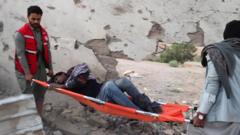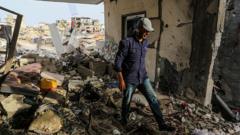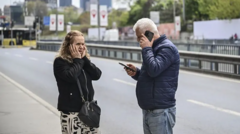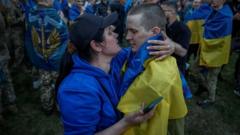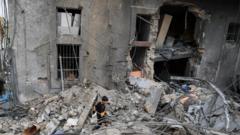The village of Sergele in Iraqi Kurdistan, once known for its agricultural bounty, now grapples with the repercussions of increased Turkish military activity in the region. This article explores the impact of military bases and airstrikes on local communities and their struggle for survival amid ongoing conflict.
Life in the Shadows of Italy's Expanding Military Presence in Kurdistan
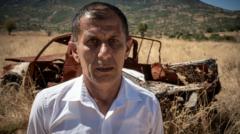
Life in the Shadows of Italy's Expanding Military Presence in Kurdistan
Villagers in Sergele face an uncertain future as Turkish military operations transform their landscape and livelihoods.
Article text:
In the heart of Iraqi Kurdistan lies the once-thriving village of Sergele, now overshadowed by a rapidly expanding Turkish military presence. For generations, locals cultivated pomegranates, almonds, and peaches, relying on the surrounding forests for wild fruits and spices. However, the village, situated just 16km (10 miles) from the Turkish border, has become engulfed by Turkish military installations, threatening both their livelihoods and their way of life.
As Turkish military bases continue to multiply, including one near a crucial water-regulating dam, residents like 50-year-old Sherwan Sergeli have been deprived of access to land that has sustained them for decades. "This is 100% a form of occupation of Kurdish lands," he lamented. The conflict has placed Sergele on the frontline of Turkey's ongoing war with the PKK, an armed Kurdistan Workers' Party, which has been fighting for Kurdish autonomy since 1984.
The so-called "Forbidden Zone," stretching nearly the entirety of the Iraqi-Turkish border, encapsulates areas affected by escalating military action. In an alarming series of drone strikes and air raids, hundreds of civilians have lost their lives, while entire villages have been displaced, according to Community Peacemaker Teams, a human rights organization. Sherwan remarked that with every base established, their situation deteriorates.
Recent investigations by the BBC reveal that Turkey has built approximately 136 military fixtures in northern Iraq, accumulating control over around 2,000 square kilometers (772 square miles) of land. Satellite imagery indicates the construction of over 660 kilometers (410 miles) of roads connecting these facilities, which has contributed to deforestation and disruption of local ecosystems.
The village of Kani Masi, also close to the border, reflects a dire fate that could potentially await Sergele. Once a center for apple agriculture, dwindling populations hint at abandonment fueled by fear of drone surveillance and military aggression. Farmer Salam Saeed has been unable to tend to his vineyard for three years due to the proximity of a Turkish base. "A drone will hover over you as soon as you arrive," he said, depicting a chilling reality faced by locals.
There appears to be a power dynamic shift as Turkish forces push the Iraqi border guards further back from the international boundary, complicating the delicate security landscape. Despite the Iraqi government's public denunciation of Turkey's military actions, their economic dependency on Turkey hampers any robust opposition. A memorandum signed in 2024 to combat PKK activities lacks limitations on Turkish troop presence, leaving Iraq's sovereignty questionable.
Complicating matters further, the Kurdistan Regional Government (KRG) has historically maintained close ties with Ankara, prioritizing mutual interests over civilian safety in military engagements. The KDP political party, dominating the regional government, places blame for Turkey's militarization on the PKK itself. "They are not harming our people," a KDP official stated, detaching responsibility for civilian casualties from Turkey.
Incidents of violence have persisted, even as the PKK's leader called for disarmament. Tragically, civilians, including a terminally ill 24-year-old named Alan Ismail, have been caught in the crossfire. His family, still grieving, accused the Kurdish authorities of failing to acknowledge his death by a supposed Turkish airstrike, opting instead to close investigations into civilian casualties.
As the battlefield in Kurdish Iraq expands with no resolution in sight, families like Alan’s face the harsh reality of loss and diminishing hope. The KRG has expressed limited acknowledgment of civilian deaths, referring to them as tragedies borne out of conflict. Yet, the pressing need for accountability remains unmet, leaving families waiting for recognition that may never come.
In a volatile landscape marked by conflicting loyalties and interests, the common folk of Sergele and Kani Masi continue to bear the scars of a forgotten war, as the struggle for survival in Iraq's "Forbidden Zone" lingers on.
In the heart of Iraqi Kurdistan lies the once-thriving village of Sergele, now overshadowed by a rapidly expanding Turkish military presence. For generations, locals cultivated pomegranates, almonds, and peaches, relying on the surrounding forests for wild fruits and spices. However, the village, situated just 16km (10 miles) from the Turkish border, has become engulfed by Turkish military installations, threatening both their livelihoods and their way of life.
As Turkish military bases continue to multiply, including one near a crucial water-regulating dam, residents like 50-year-old Sherwan Sergeli have been deprived of access to land that has sustained them for decades. "This is 100% a form of occupation of Kurdish lands," he lamented. The conflict has placed Sergele on the frontline of Turkey's ongoing war with the PKK, an armed Kurdistan Workers' Party, which has been fighting for Kurdish autonomy since 1984.
The so-called "Forbidden Zone," stretching nearly the entirety of the Iraqi-Turkish border, encapsulates areas affected by escalating military action. In an alarming series of drone strikes and air raids, hundreds of civilians have lost their lives, while entire villages have been displaced, according to Community Peacemaker Teams, a human rights organization. Sherwan remarked that with every base established, their situation deteriorates.
Recent investigations by the BBC reveal that Turkey has built approximately 136 military fixtures in northern Iraq, accumulating control over around 2,000 square kilometers (772 square miles) of land. Satellite imagery indicates the construction of over 660 kilometers (410 miles) of roads connecting these facilities, which has contributed to deforestation and disruption of local ecosystems.
The village of Kani Masi, also close to the border, reflects a dire fate that could potentially await Sergele. Once a center for apple agriculture, dwindling populations hint at abandonment fueled by fear of drone surveillance and military aggression. Farmer Salam Saeed has been unable to tend to his vineyard for three years due to the proximity of a Turkish base. "A drone will hover over you as soon as you arrive," he said, depicting a chilling reality faced by locals.
There appears to be a power dynamic shift as Turkish forces push the Iraqi border guards further back from the international boundary, complicating the delicate security landscape. Despite the Iraqi government's public denunciation of Turkey's military actions, their economic dependency on Turkey hampers any robust opposition. A memorandum signed in 2024 to combat PKK activities lacks limitations on Turkish troop presence, leaving Iraq's sovereignty questionable.
Complicating matters further, the Kurdistan Regional Government (KRG) has historically maintained close ties with Ankara, prioritizing mutual interests over civilian safety in military engagements. The KDP political party, dominating the regional government, places blame for Turkey's militarization on the PKK itself. "They are not harming our people," a KDP official stated, detaching responsibility for civilian casualties from Turkey.
Incidents of violence have persisted, even as the PKK's leader called for disarmament. Tragically, civilians, including a terminally ill 24-year-old named Alan Ismail, have been caught in the crossfire. His family, still grieving, accused the Kurdish authorities of failing to acknowledge his death by a supposed Turkish airstrike, opting instead to close investigations into civilian casualties.
As the battlefield in Kurdish Iraq expands with no resolution in sight, families like Alan’s face the harsh reality of loss and diminishing hope. The KRG has expressed limited acknowledgment of civilian deaths, referring to them as tragedies borne out of conflict. Yet, the pressing need for accountability remains unmet, leaving families waiting for recognition that may never come.
In a volatile landscape marked by conflicting loyalties and interests, the common folk of Sergele and Kani Masi continue to bear the scars of a forgotten war, as the struggle for survival in Iraq's "Forbidden Zone" lingers on.

